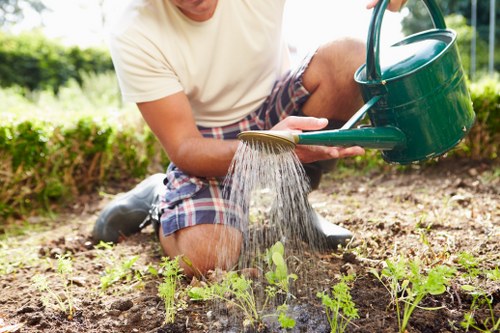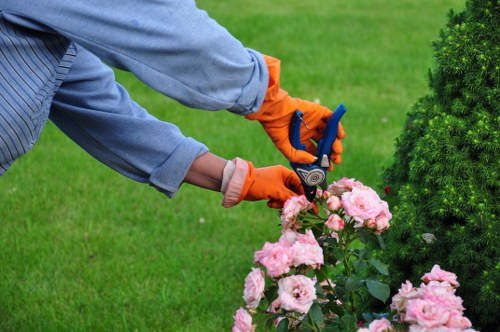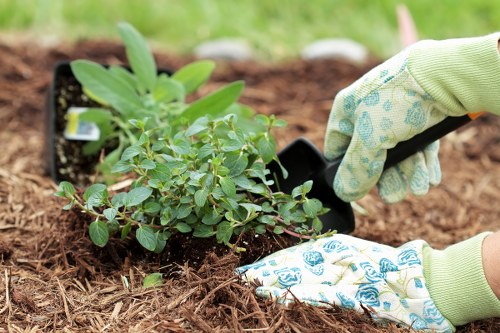Driveway Algae Removal in Poplar: Effective Solutions to Keep Your Drive Clean

Maintaining a clean driveway is essential for both the aesthetics and longevity of your property. In Poplar, where the damp climate can foster the growth of algae on driveways, effective algae removal is crucial. Algae not only makes your driveway look unsightly but can also cause slippery surfaces, posing safety risks for you and your family.
Understanding the best methods for algae removal can help you keep your driveway free from unsightly green patches and ensure it remains safe and inviting. This article explores various techniques and tips for effectively removing algae from driveways in Poplar.
Whether you’re dealing with light discoloration or severe algae growth, knowing the right approach will save you time and effort. Let’s delve into the causes of algae growth, signs that your driveway needs attention, and the most effective removal strategies available.
Understanding Algae Growth on Driveways

Algae, a simple plant-like organism, thrives in moist and shaded environments, making driveways in Poplar an ideal breeding ground. The combination of frequent rainfalls and limited sunlight creates perfect conditions for algae to flourish, especially on shaded areas of your driveway.
Over time, algae can create a slimy layer on your driveway surface, which not only looks unappealing but can also lead to more serious structural issues if left untreated. The dark green or black patches are not just a cosmetic problem; they indicate excessive moisture retention, which can weaken the driveway material.
Understanding the conditions that promote algae growth is the first step in preventing and removing it. By addressing these environmental factors, you can minimize the recurrence of algae and maintain a clean driveway year-round.
Causes of Algae Formation
Several factors contribute to the growth of algae on driveways:
- Moisture: Continuous moisture from rain, dew, or poor drainage keeps the driveway damp, creating an ideal environment for algae.
- Shade: Areas that receive limited sunlight allow algae to thrive, as sunlight can inhibit their growth.
- Nutrients: Organic matter, such as leaves and debris, can provide nutrients that support algae proliferation.
- Temperature: Mild temperatures in Poplar promote the growth of algae throughout the year.
Signs Your Driveway Needs Algae Removal

Identifying the presence of algae early can help you take timely action to prevent extensive damage. Here are some common signs that your driveway may need algae removal:
- Discoloration: Noticeable green or black spots on the driveway surface are primary indicators of algae growth.
- Slippery Surface: Algae can make your driveway slick, increasing the risk of slips and falls, especially when wet.
- Odor: A musty smell may accompany extensive algae growth, indicating underlying moisture issues.
- Structural Damage: Prolonged algae presence can weaken driveway materials, leading to cracks and deterioration.
Health and Safety Risks
Beyond aesthetic concerns, algae on driveways pose health and safety risks. The slippery surface can lead to accidents, particularly for children and the elderly. Additionally, the presence of algae often signals excessive moisture, which can contribute to mold growth and other health hazards within your home.
Addressing algae promptly not only preserves the appearance of your driveway but also ensures a safer environment for everyone in your household.

Effective Methods for Algae Removal
There are several effective methods to remove algae from driveways. The choice of method depends on the severity of the growth and the type of driveway surface you have.
Here are some proven techniques to eliminate algae and restore your driveway’s appearance:
- Pressure Washing: Using a pressure washer can effectively remove algae by blasting away the growth with high-pressure water.
- Bleach Solutions: A mixture of bleach and water can kill algae and remove stains, but it should be used with caution to avoid damaging the driveway.
- Vinegar and Baking Soda: A natural and eco-friendly approach involves using vinegar and baking soda to scrub away algae without harsh chemicals.
- Commercial Algae Cleaners: Specialized products are available that are designed to target and eliminate algae growth on driveways.
- Preventive Sealants: Applying a driveway sealant can prevent moisture from accumulating, thereby inhibiting algae growth.
DIY vs. Professional Services
When deciding between a DIY approach and hiring professional services, consider the extent of the algae growth and the type of driveway you have. For minor algae issues, DIY methods like pressure washing or using natural cleaners may suffice.
However, for more severe infestations or delicate driveway materials, it might be best to enlist the help of professional algae removal services in Poplar. Professionals have the expertise and equipment to handle tough algae growth without causing damage to your driveway.
Step-by-Step Guide to Removing Algae

Removing algae from your driveway can be straightforward if you follow the right steps. Here’s a step-by-step guide to help you efficiently eliminate algae growth:
- Clear the Area: Remove any debris, leaves, or other organic matter from the driveway to ensure a clean working surface.
- Choose Your Cleaning Solution: Depending on your preference and driveway type, select an appropriate algae removal solution such as bleach, vinegar, or a commercial cleaner.
- Apply the Cleaner: Evenly spread the cleaning solution over the affected areas, ensuring thorough coverage.
- Let It Sit: Allow the solution to work on the algae for the recommended amount of time, typically 15-30 minutes.
- Scrub the Driveway: Use a stiff brush to scrub the algae-infested areas, dislodging the growth from the surface.
- Rinse Thoroughly: Use a pressure washer or hose to rinse away the cleaning solution and dead algae, leaving your driveway clean.
- Apply a Sealant: Once dry, consider applying a driveway sealant to protect against future algae growth.
Safety Precautions
When using chemical cleaners like bleach, it’s essential to take safety precautions. Wear protective gloves and eyewear, and ensure proper ventilation if working in enclosed areas. Always follow the manufacturer’s instructions for any cleaning product to prevent accidents and damage to your driveway.
For natural cleaners, while they are generally safer, it’s still advisable to test the solution on a small, inconspicuous area first to ensure it does not affect the driveway material.
Preventing Future Algae Growth
Prevention is always better than cure. Implementing preventive measures can significantly reduce the likelihood of algae returning to your driveway:
- Improve Drainage: Ensure your driveway has proper drainage to prevent water accumulation, which can create a moist environment for algae.
- Increase Sunlight Exposure: Trim nearby trees and shrubs to allow more sunlight to reach your driveway, inhibiting algae growth.
- Regular Cleaning: Keep your driveway free from debris and regularly clean it to prevent organic matter from providing nutrients for algae.
- Apply Sealant: A high-quality driveway sealant acts as a barrier against moisture and algae, extending the life of your driveway.
- Use Algae-Resistant Materials: When constructing or renovating your driveway, consider using materials that are less prone to algae growth.
Landscaping Considerations
Proper landscaping around your driveway can contribute to preventing algae growth. Avoid overwatering plants near the driveway and choose plants that require less water. Additionally, creating shaded areas that do not retain excessive moisture can help deter algae from taking hold.
Choosing the Right Algae Removal Service in Poplar
If you decide to hire a professional for algae removal, selecting the right service is crucial. Here are some tips to help you make an informed decision:
- Experience and Expertise: Choose a company with a proven track record and expertise in algae removal for driveways.
- Customer Reviews: Check online reviews and testimonials to gauge the quality of service provided by the company.
- Eco-Friendly Options: Opt for services that use environmentally friendly cleaning solutions to protect your driveway and the surrounding ecosystem.
- Cost-Effectiveness: Compare prices from different providers to ensure you receive value for your money without compromising on quality.
- Guarantees: Select a service that offers guarantees or warranties on their work, providing peace of mind that the algae removal will be effective.
Top Algae Removal Services in Poplar
Poplar offers a range of professional algae removal services catering to different driveway types and budgets. Some of the top-rated services include:
- Poplar Driveway Cleaners: Known for their thorough cleaning methods and professional approach.
- EcoClean Services: Specializes in eco-friendly algae removal solutions, ensuring minimal environmental impact.
- Driveway Solutions Poplar: Offers comprehensive services, including preventive measures and regular maintenance plans.
- AlgaeFree Driveways: Focuses on tough algae removal, suitable for heavily infested driveways.
- BrightDrive Cleaners: Provides affordable and reliable algae removal services with a satisfaction guarantee.
Maintaining a Clean Driveway Year-Round
Keeping your driveway algae-free requires ongoing maintenance and vigilance. Here are some tips to help you maintain a clean driveway throughout the year:
- Regular Inspections: Periodically check your driveway for any signs of algae growth, especially after heavy rains.
- Prompt Cleaning: Address algae growth immediately to prevent it from spreading and causing more damage.
- Maintain Drainage Systems: Ensure that gutters and drains are clear of debris to prevent water accumulation on your driveway.
- Reseal Periodically: Reapply driveway sealant as recommended to maintain its protective barrier against moisture and algae.
- Educate Household Members: Inform everyone in your household about the importance of keeping the driveway clean and free from clutter that can harbor algae.
Seasonal Maintenance Tips
Different seasons bring different challenges for driveway maintenance:
- Spring: Clean up spring debris and check for any seasonal algae growth.
- Summer: Maintain adequate sunlight exposure by trimming overhanging branches and ensuring proper ventilation.
- Autumn: Remove fallen leaves and prevent them from accumulating on the driveway, reducing nutrients for algae.
- Winter: Protect your driveway from ice and snow, which can exacerbate moisture retention and algae growth.
Local Relevance: Nearby Areas to Poplar for Driveway Algae Removal
Poplar is surrounded by several areas where residents also face challenges with driveway algae growth. Understanding the unique features of these nearby locations can help tailor algae removal strategies effectively:
- Canning Town: Just west of Poplar, Canning Town experiences similar moisture levels, making algae prevention crucial.
- Wapping: Close to the River Thames, Wapping’s proximity to water contributes to higher humidity and algae growth.
- Blackwall: This area’s shaded streets and older buildings provide ideal conditions for algae to thrive.
- Canary Wharf: Although more urban, Canary Wharf’s concrete surfaces can trap moisture, promoting algae development.
- Aldgate: The compact infrastructure in Aldgate leads to limited drainage, increasing the risk of algae on driveways.
- Docklands: With its waterfront location, Docklands shares Poplar’s high moisture environment, necessitating regular algae maintenance.
- Stratford: The mixed-use buildings in Stratford create varied microclimates that can support algae growth in shaded areas.
- Bow: Bow’s historical architecture often features retaining walls and shaded walkways, perfect for algae proliferation.
- Deptford: Located south of Poplar, Deptford’s damp climate similar to Poplar requires effective algae removal solutions.
- Stepney: Stepney’s residential areas with ample greenery can trap moisture, fostering algae-friendly conditions.
- Surrey Quays: The bustling Surrey Quays area must balance high foot traffic with maintaining clean, algae-free driveways.
- Island Gardens: This picturesque area with gardens and views of the Thames needs regular algae upkeep to preserve its beauty.
- Marshgate: Marshgate’s less commercialized environment offers unique challenges for algae prevention and removal.
- Millwall: Millwall’s combination of residential and industrial zones results in varied moisture levels, affecting algae growth.
- East India: The historic East India area requires gentle yet effective algae removal methods to protect its classic driveway surfaces.
Environmental Considerations in Algae Removal
When removing algae, it’s important to consider the environmental impact of the methods you choose. Opting for eco-friendly solutions not only protects your driveway but also preserves the surrounding ecosystem.
Using natural cleaners like vinegar and baking soda reduces the reliance on harsh chemicals that can leach into the soil and waterways, harming local flora and fauna. Additionally, employing preventive measures like proper drainage and sealants minimizes the need for frequent chemical treatments.
Eco-Friendly Algae Removal Tips
- Use Natural Cleaners: Vinegar and baking soda are effective and safe alternatives to chemical cleaners.
- Limit Chemical Runoff: When using commercial cleaners, ensure proper rinsing to prevent chemical runoff into gardens and drainage systems.
- Choose Biodegradable Products: Select algae removal products that are biodegradable and environmentally friendly.
- Promote Sustainable Practices: Implement landscaping and maintenance practices that reduce moisture retention and algae growth naturally.
Conclusion
Algae growth on driveways in Poplar is a common issue due to the area’s moist climate and shaded environments. Addressing algae effectively requires understanding its causes, identifying signs early, and choosing the right removal methods. Whether you opt for DIY solutions or professional services, maintaining a clean driveway involves regular upkeep and preventive measures.
By implementing the strategies discussed in this article, you can ensure your driveway remains algae-free, safe, and visually appealing. Embrace both practical cleaning techniques and eco-friendly practices to protect your property and contribute to a healthier environment in Poplar.
Frequently Asked Questions

1. What are the most effective natural methods for removing algae from driveways?
Natural methods such as using a mixture of vinegar and water or baking soda and water are effective for removing algae without harming the environment. Scrubbing the solution onto the affected areas and rinsing thoroughly can eliminate algae growth.
2. How often should I clean my driveway to prevent algae growth?
Regular cleaning, at least twice a year, can help prevent algae growth. Additionally, inspecting your driveway after heavy rains or during damp seasons can allow for timely removal before algae becomes a significant issue.
3. Can algae damage the structure of my driveway?
Yes, prolonged algae growth can retain moisture, which may weaken driveway materials over time. This can lead to cracks, deterioration, and costly repairs if not addressed promptly.
4. Are there preventive sealants specifically for algae resistance?
Yes, there are driveway sealants available that contain algae-resistant properties. These sealants create a barrier that minimizes moisture retention and inhibits algae growth, prolonging the cleanliness and integrity of your driveway.
5. Is it necessary to hire a professional for algae removal?
While DIY methods are effective for minor algae issues, professional services are recommended for severe infestations or delicate driveway materials. Professionals have the expertise and equipment to remove algae safely and efficiently without causing damage.
Frequently Asked Questions
Discover effective strategies for driveway algae removal in Poplar. Learn causes, signs, removal methods, prevention tips, and local service options to maintain a clean, safe driveway.
Get A Quote

